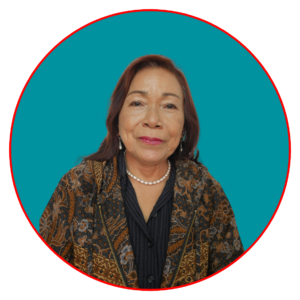
Ketut Tuti Parwati Merati, Prof, DR, dr, Sp.PD-KPTI, FINASIM
Prof. DR. dr. Ketut Tuti Parwati Merati, Sp.Pd-KPTI, FINASIM is the Steering Committee member at site 520 (RSUP. Sanglah, Denpasar.)
She was born on 28 December 1948 in Denpasar. Known as an assertive and energetic person, the Leader of Tropic-Infection Division, Internal Medicine, Sanglah Public Hospital obtained her MD from Udayana University School of Medicine in 1976. She completed her studies and got her educational specialist degree in Internal Medicine from Faculty of Medicine, Airlangga University in 1984. In 1992, she joined the training in Research Method in CAPS (Centre for Aids Prevention Studies) in California University, San Francisco, USA. She obtained her Tropic Infection Consultant in 1997, PhD in Biomedical related to HIV AIDS in 2007, and also FINASIM (Fellow of Indonesian Society of Internal Medicine) in 2009.
Prof. DR. dr. Ketut Tuti Parwati Merati is the one who discovered the first HIV/AIDS case at RSUP Sanglah (in April 1987). At that time, she was an Internist working at Sanglah Public Hospital. The first case of HIV was identified in a foreigner from the Netherlands who came to see her because he had cough. At that point, this patient was not really open regarding to his sickness. After conducting a series of checkup procedure, Kaposi Sarcoma was found on his skin. Based on the facts found, she continued checking the patient’s blood sample and sent it to NIHRD, as laboratories in Bali were not able to check for HIV/AIDS yet. Later on, the case was announced as the first case of HIV/AIDS in Indonesia by the Ministry of Health, Republic of Indonesia. After that discovery, she became more focused on HIV/AIDS prevention. With the help of Australia and commitment from Indonesian government in the end of 1987, three doctors including her and three nurses from three different hospitals in Indonesia were funded to go to Sidney, Australia to study HIV/AIDS further. At that time, there were lots of AIDS patients in Sydney.
Her love and dedication to science especially that related to HIV/AIDS are reflected by the number of research she has done in local, national, and international level starting from 1989 until this moment. Her research involves behavior & prevention of HIV/AIDS, clinical researches, treatments and bio molecular which relates to HIV/AIDS. In 1989 she undertook a research regarding the knowledge, attitude, and behavior on five groups at risk for HIV/AIDS: sex workers, homosexuals, transgender, drug users, and people working in tourism industry. In 1992, she established YCUI (Yayasan Citra Usadha Indonesia), which main activity is to do counseling for those five groups. The difficulty in approaching those groups is the main challenge to train outreach workers. Outreach worker model attracted the attention of HIV/AIDS NGOs worldwide in 1994, and what was happening was featured in Science magazine: Model Program Take Aim at HIV Rates in Indonesia (science, volume 264, 1 April 1994), and several national and international newspapers such as Worldview: Working Bali Streets (worldview, summer 1994, p 27-29), Innovative Effort Checks AIDS Spread in Indonesia (Boston Globe international newspaper dated 25 April 1994), dr. Tuti Parwati Commits to Fighting HIV/AIDS (The Jakarta Post, February 8, 2007). In 2004 she joined an Asia-Australia researchers’ network TAHOD (Treat Asia HIV Observational Database, and TASER (Treat Asia Study to Evaluate Resistance, 2008-now). The Health Minister of Republic of Indonesia appreciated her dedication in community service and prevention of HIV/AIDS in Indonesia in August 2007. In the same year, she also received an honor from Coordinating Minister for People’s Welfare of Indonesia on Pioneer and Dedication That Never Subsides in preventing HIV/AIDS in Indonesia. The Marquis Who’s Who Publication Board chose her as one of a few significant figures whose biography was listed on WHO’s Biography in WHO in ASIA 1st edition in 2007. In 2010, she was awarded by Minister of Women and Child Protection together with UNESCO National Committee as one of 100 significant women researchers whose biography was published in “One of One Hundred Women Achievers Researchers in Indonesia”.
As a Steering Committee at site 520, she has been contributing lots of ideas and feedback for the research involving steps to recruit children subjects as well as character building of Research Assistants in reviewing cases together with internal residents. When she was asked about the challenges she has faced as Steering Committee member, she admitted that it is not easy to maintain the site internally. According to her the solution of this issue is to emphasize on the communication and commitment aspect. Good intention and clear communication will create a sense of belonging, so all people and sites involved in the research will become close. Commitment is crucial considering the large number of tasks aside from those related to the research. Another challenge that she mentioned is bureaucracy which can potentially obstruct the start of any research. For example, delayed licensing will postpone the start of the research.
She appreciates the existence of INA- RESPOND Network as the network is the embryo of future multicenter research. This comment was also shared during the NSC meeting in Bandung (2014), where according to her, the hospitals involved in the AFIRE study have received benefits of the network existence. “As researchers, the doctors can learn how to carry out a good clinical research. And in the meantime, the site itself can learn about standards of care implemented by other sites. She hopes that this network can grow further by building up communication and mutual interest between involved parties.
